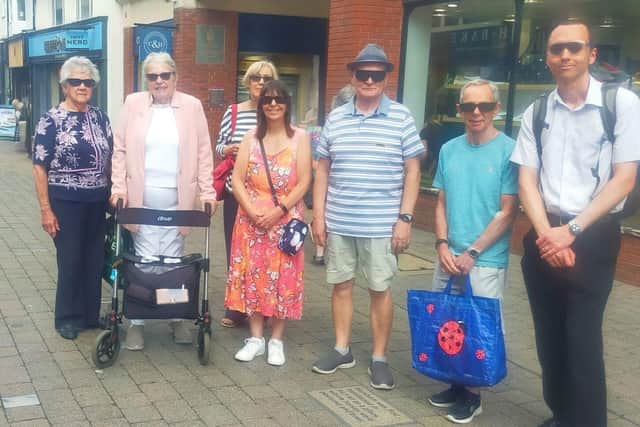Glasses simulate life with sight loss for accessibility walkers in Horsham
and live on Freeview channel 276
As a result, a national sight loss charity organised an accessibility walk in Horsham, where West Sussex County Council officers wore special glasses which simulated a visual impairment.
The event on Wednesday, June 21 was held by the Macular Society, which supports people with macular disease – the biggest cause of sight loss in the UK - who took West Sussex County Council transport planners through East Street, West Street and the Carfax. Joined by David Smith, engagement manager for the South East at national charity Thomas Pocklington Trust, they were helped by members of the Macular Society’s Horsham Support Group - people with macular disease who get together every month for support, information and to meet each other over a cup of tea or coffee.
Advertisement
Hide AdAdvertisement
Hide AdCounty Council officers were keen to find out how people with sight loss can adapt to their surroundings, and in particular how they manage pedestrianised areas including potentially hazardous features such as seating and advertising boards.


Macular Society senior regional manager for south of England, Stella Black, said: “It was great to welcome the council officers for this walk with simulated spectacles and they were shocked to see how challenging an everyday activity walking can become. They were very keen to learn from our group members and have taken a lot of information and thoughts away with them, as a result of the session.
“Age-related macular degeneration (AMD) causes a gradual loss of central vision as you get older, and navigating a town centre which has obstacles, uneven paving and poor signage, becomes ever more frustrating and time consuming.
“Our Horsham group members were very keen to highlight the problems, explain more about the condition and also what they get out of attending the group every month. They all felt the exercise had been really worthwhile.”
Advertisement
Hide AdAdvertisement
Hide AdA County Council spokesperson said: “We thank the Macular Society for inviting our team on the accessibility walk. We found this very informative in understanding some of the challenges faced by the local group in using the streets of Horsham, which will help us to think about ways to make our streets more accessible for all.”
Nearly 1.5 million people are currently affected by macular disease and many more are at risk. The disease can have a devastating effect on people’s lives, leaving them unable to drive, read or see faces.
Many people affected describe losing their sight as being similar to bereavement. There is still no cure and most types of the disease are not treatable. AMD is the most common form of macular disease, affecting more than 600,000 people, usually over the age of 50.
To find out more about the Macular Society Horsham Support Group, which is available to people with a sight condition, call Stella Black on 07494 467 980 or email [email protected]
For general information on macular disease, call the Macular Society on 0300 3030 111 or email [email protected]